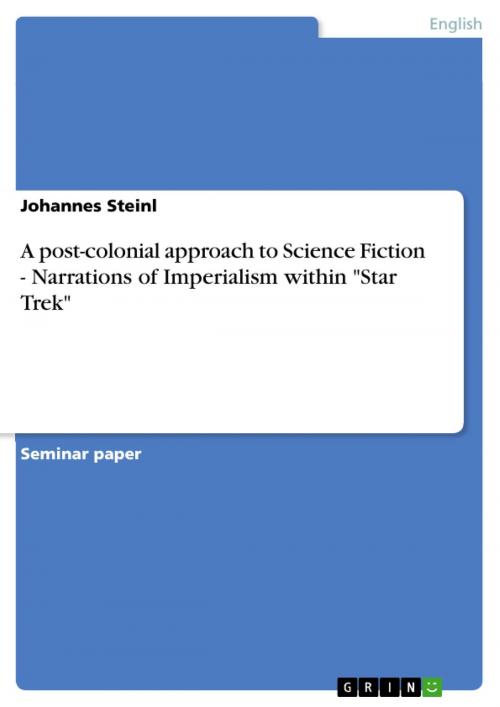A post-colonial approach to Science Fiction - Narrations of Imperialism within 'Star Trek'
Nonfiction, Entertainment, Drama, Anthologies| Author: | Johannes Steinl | ISBN: | 9783640805617 |
| Publisher: | GRIN Verlag | Publication: | January 19, 2011 |
| Imprint: | GRIN Verlag | Language: | English |
| Author: | Johannes Steinl |
| ISBN: | 9783640805617 |
| Publisher: | GRIN Verlag |
| Publication: | January 19, 2011 |
| Imprint: | GRIN Verlag |
| Language: | English |
Seminar paper from the year 2010 in the subject American Studies - Culture and Applied Geography, grade: 1,0, University of Frankfurt (Main) (Neue Englischsprachige Kulturen und Literaturen), language: English, abstract: 'Space, the Final Frontier. These are the voyages of the starship Enterprise. Its continuing mission: to explore strange new worlds, to seek out new life and new civilizations, to boldly go, where no one has gone before.' - Opening credits of Star Trek: The Next Generation These are the opening lines of one of the most successful franchises of popular culture: Star Trek. In 1966 when the first episode of the science-fiction series 'Star Trek' The Original Series was aired on US television author and creator Gene Roddenberry would not possibly have envisioned the cultural and political impact Star Trek would have even four decades later. He nevertheless envisioned very clearly that this 'trek' would take its audience to 'strange new worlds [...] and new civilizations'. That this would exactly fall into the field of the discourses of postcolonial studies is no mere coincidence. The opening credits very straightforwardly indicate what voyages the audience will participate in. The exploration of 'strange new worlds' and 'new civilizations' recalls the narratives of Imperialism and Colonialism. Accordingly Star Trek can be read as another form of travelogue. The purpose of this work is to establish the narratives of Star Trek as a travelogue in the context of imperialist and colonial discourses. Having done so, I will examine Star Trek's standing within these discourses. My focus will be on the depiction of 'the other' within Star Trek. On the basis of one episode of the TV series, Star Trek: The Next Generation I will juxtapose the argument of critics that Trek is either racist and imperialist in its conception or the depiction of a desirable Utopia.
Seminar paper from the year 2010 in the subject American Studies - Culture and Applied Geography, grade: 1,0, University of Frankfurt (Main) (Neue Englischsprachige Kulturen und Literaturen), language: English, abstract: 'Space, the Final Frontier. These are the voyages of the starship Enterprise. Its continuing mission: to explore strange new worlds, to seek out new life and new civilizations, to boldly go, where no one has gone before.' - Opening credits of Star Trek: The Next Generation These are the opening lines of one of the most successful franchises of popular culture: Star Trek. In 1966 when the first episode of the science-fiction series 'Star Trek' The Original Series was aired on US television author and creator Gene Roddenberry would not possibly have envisioned the cultural and political impact Star Trek would have even four decades later. He nevertheless envisioned very clearly that this 'trek' would take its audience to 'strange new worlds [...] and new civilizations'. That this would exactly fall into the field of the discourses of postcolonial studies is no mere coincidence. The opening credits very straightforwardly indicate what voyages the audience will participate in. The exploration of 'strange new worlds' and 'new civilizations' recalls the narratives of Imperialism and Colonialism. Accordingly Star Trek can be read as another form of travelogue. The purpose of this work is to establish the narratives of Star Trek as a travelogue in the context of imperialist and colonial discourses. Having done so, I will examine Star Trek's standing within these discourses. My focus will be on the depiction of 'the other' within Star Trek. On the basis of one episode of the TV series, Star Trek: The Next Generation I will juxtapose the argument of critics that Trek is either racist and imperialist in its conception or the depiction of a desirable Utopia.















